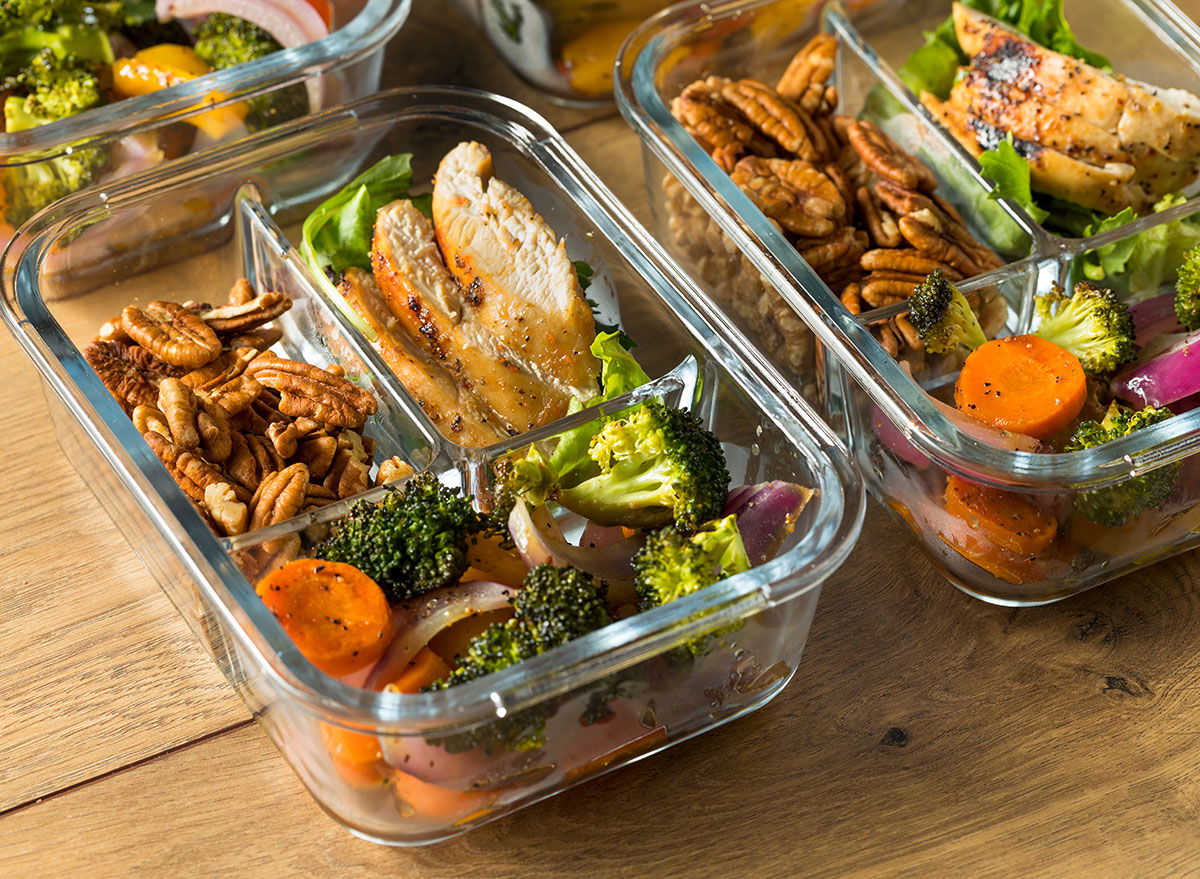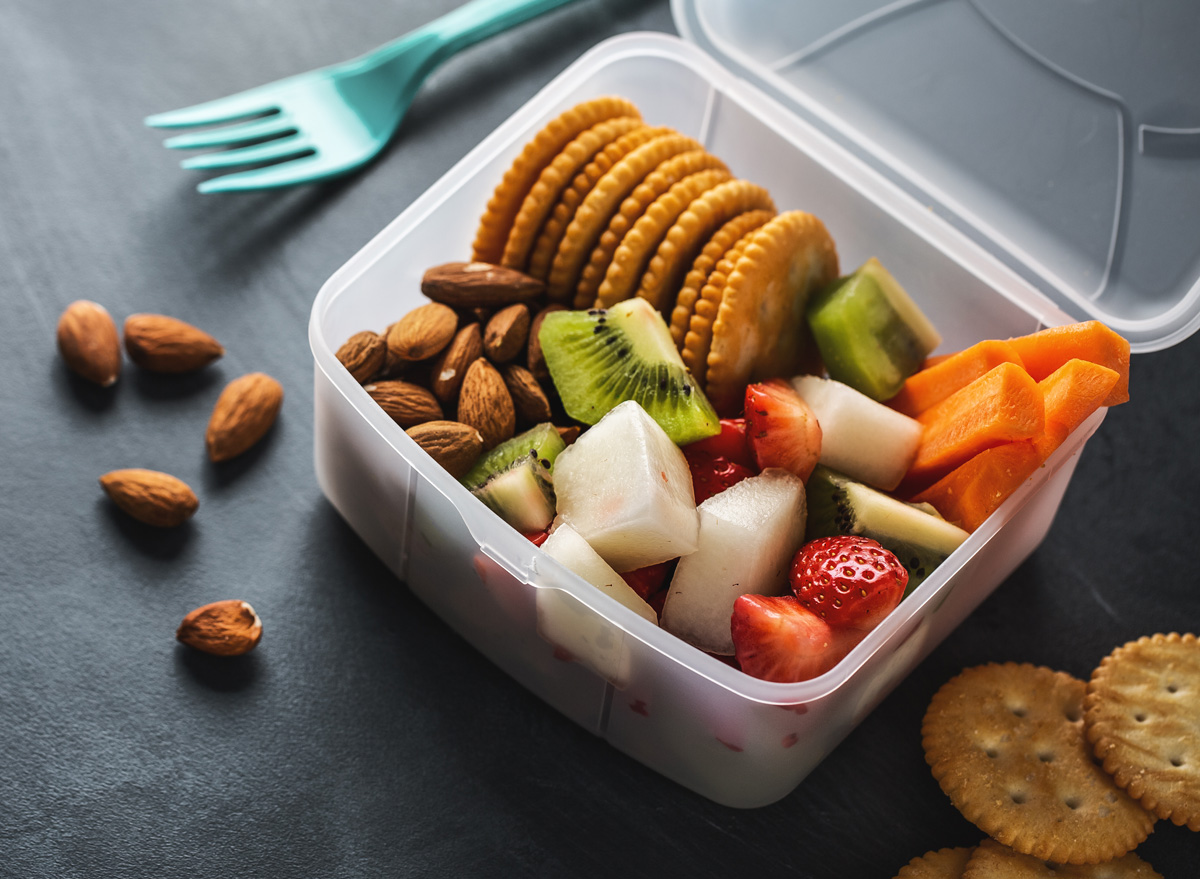9 Ways to Stop Stress Eating, According to Experts

When we feel stressed, many of us turn to food. And this year more than ever, the coronavirus pandemic has left many of us to stress eat as we seek out food for comfort, out of boredom, or just because it’s there.
There are multiple reasons you may resort to stress eating. “We generally tend to stress eat when we feel overwhelmed or are avoiding something. We may also stress eating if we grew up using that as a tool for emotional well-being,” says Maggie Luther, ND, a naturopathic doctor and Medical Director and Formulator at Care/of .
Hormones may also play a role: “Stress eating can also occur due to certain hormones that course through our bodies at higher concentrations when we are stressed. Cortisol is a well-known stress hormone that can cause us to want to eat more,” says Jen Bruning, MS, RDN, LDN, registered dietitian nutritionist and spokesperson for the Academy of Nutrition & Dietetics. “Another is Ghrelin, dubbed the ‘hunger hormone’. Ghrelin levels can increase with stress and make us feel hungrier.”
The trick is to have ways to break the cycle of stress eating dependence. Here are 9 tips to help break the cycle. Read on, and for more on how to eat healthy, don’t miss 7 Healthiest Foods to Eat Right Now.
Build mindfulness and check in with your body.

“When we stress eat, it is often unconscious. The first thing we need to do is build awareness of our actions. When you are tempted to go stress eat, notice what you are thinking. Are you avoiding a task, feeling overwhelmed by a surprise project, or have kids yelling at you in the background of your zoom meeting? Life’s stressors often don’t end, but the way we respond to stress can absolutely be adapted,” says Luther. “By first building the awareness of when you tend to go stress eat, you will be much more successful at changing your behavior over the long-term. Once you notice you are making your way to the fridge or cabinet, now is the time to use one of the other tips to divert your mind and focus away from stress eating and towards stress reduction!” Maybe take a look at these 11 Mindfulness Hacks to Eat Less, According to Experts.
Practice self-compassion.

“Recognize how badly you want to feel a sense of ease and how unpleasant stress feels in the body. When you want to stress eat, offer yourself a moment of self-compassion by reciting a couple of compassionate phrases in your mind, like ‘May I have ease. May I be free from stress’. Do this for a few moments,” says Stephanie Wagner, NBC-HWC, board-certified health and wellness coach and program specialist at Healthy Minds Innovations at the Center for Healthy Minds at the University of Wisconsin-Madison. “By responding to stress with self-compassion, you can develop a healthier relationship with stress—learning to accept it, rather than resist it. Resistance often fuels stress, generating more momentum to stress-eat. Try this seated meditation to find compassion in difficult situations.”
Food prep.

“Set some expectations for your week by food prepping a few days in advance. Have a plan for meals and snacks, even emotional ’emergency foods’ during stressful times. Then as you go about your day, you can be reminded of the meal or snack that’s to come and be less tempted to stare mindlessly into your fridge when stress hits,” says Bruning. “You can even plan for the high-stress moments by knowing what, and how much of a certain food will help calm you down and meet your immediate need. Total restriction tends to backfire—having a plan can help prevent this.”
Take a few mindful deep breaths.

“In those moments when you feel really stressed out, take a couple of slow deep breaths,” says Wagner. “The breath can have a naturally soothing impact on the nervous system and also has a calming effect on the mind and body, providing stress-relief that does not involve eating. Try out this brief, seated meditation to support mindful breathing.”
Get outside

“The outdoors includes things like sunshine and fresh air. Even in the middle of winter, getting outdoors will reduce stress and promote a sense of wellbeing because of these natural elements,” says Luther. “When we find ourselves opening the fridge or starring in the cabinet, tell yourself, ‘Hey, this would be the perfect time to throw my coat on and get outside or open a window for 5-10 minutes.’ This simple activity will give us a chance to zone out, which the brain needs. As much as the brain needs to focus, it also needs to relax. This activity will reduce stress eating, get your nervous system calmed down, and help your brain better focus for the work ahead.”
Pick up a handy-hobby.

“Often creative in nature, a hobby that requires you to use your (clean) hands can help keep you from mindlessly reaching for snacks,” says Bruning. “Something like needlework, scrapbooking, jewelry-making, journaling, blogging, etc. keeps your hands occupied, and can soothe your mind.”
Reflect on your core values in those stressful moments.

“At the beginning of the day, bring to mind a few core values that are important to you, like generosity, compassion, kindness, etc.,” says Wagner. “When you feel the urge to stress-eat, ask yourself ‘What activity can I do right now that is more aligned with my values?’ If well-being is a value, maybe choose to go for a walk or take a calming bath. If relationships are important, try calling a friend. Aligning your stress-relieving strategies with your values can help you manage your stress in healthier ways. This 10-minute active meditation is a great start.”
Drink a glass of water.

“Oftentimes when we stress eat, we aren’t even really hungry. So instead of going to the fridge or cabinet, head to the faucet instead,” says Luther. “Fill up a glass of water, add a squeeze of lemon or a couple of frozen berries. Enjoy the glass of water and allow the urge to stress eat diffuse.” Speaking of lemon water… have you read about What Happens To Your Body When You Drink Lemon Water Every Day?
Have a pre-portioned snack.

“Just because you’re stressed doesn’t mean you shouldn’t eat. Having an intentionally portioned snack or meal in a time of stress can help us feel reassured that the need for sustenance is met,” says Bruning. “A small snack between meals can actually help keep us from overindulging later when we’re famished. Plus, regular snacks can help regulate the variations in blood sugar that we experience between eating occasions.” Check out these 50 Healthy Snack Ideas to Throw Together in Minutes.








